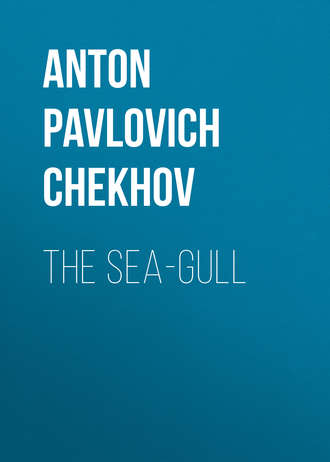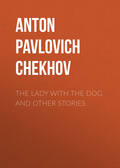
Антон Чехов
The Sea-Gull
ARKADINA. I smell sulphur. Is that done on purpose?
TREPLIEFF. Yes.
ARKADINA. Oh, I see; that is part of the effect.
TREPLIEFF. Mother!
NINA. He longs for man —
PAULINA. [To DORN] You have taken off your hat again! Put it on, you will catch cold.
ARKADINA. The doctor has taken off his hat to Satan father of eternal matter —
TREPLIEFF. [Loudly and angrily] Enough of this! There’s an end to the performance. Down with the curtain!
ARKADINA. Why, what are you so angry about?
TREPLIEFF. [Stamping his foot] The curtain; down with it! [The curtain falls] Excuse me, I forgot that only a chosen few might write plays or act them. I have infringed the monopoly. I – I —
He would like to say more, but waves his hand instead, and goes out to the left.
ARKADINA. What is the matter with him?
SORIN. You should not handle youthful egoism so roughly, sister.
ARKADINA. What did I say to him?
SORIN. You hurt his feelings.
ARKADINA. But he told me himself that this was all in fun, so I treated his play as if it were a comedy.
SORIN. Nevertheless —
ARKADINA. Now it appears that he has produced a masterpiece, if you please! I suppose it was not meant to amuse us at all, but that he arranged the performance and fumigated us with sulphur to demonstrate to us how plays should be written, and what is worth acting. I am tired of him. No one could stand his constant thrusts and sallies. He is a wilful, egotistic boy.
SORIN. He had hoped to give you pleasure.
ARKADINA. Is that so? I notice, though, that he did not choose an ordinary play, but forced his decadent trash on us. I am willing to listen to any raving, so long as it is not meant seriously, but in showing us this, he pretended to be introducing us to a new form of art, and inaugurating a new era. In my opinion, there was nothing new about it, it was simply an exhibition of bad temper.
TRIGORIN. Everybody must write as he feels, and as best he may.
ARKADINA. Let him write as he feels and can, but let him spare me his nonsense.
DORN. Thou art angry, O Jove!
ARKADINA. I am a woman, not Jove. [She lights a cigarette] And I am not angry, I am only sorry to see a young man foolishly wasting his time. I did not mean to hurt him.
MEDVIEDENKO. No one has any ground for separating life from matter, as the spirit may well consist of the union of material atoms. [Excitedly, to TRIGORIN] Some day you should write a play, and put on the stage the life of a schoolmaster. It is a hard, hard life.
ARKADINA. I agree with you, but do not let us talk about plays or atoms now. This is such a lovely evening. Listen to the singing, friends, how sweet it sounds.
PAULINA. Yes, they are singing across the water. [A pause.]
ARKADINA. [To TRIGORIN] Sit down beside me here. Ten or fifteen years ago we had music and singing on this lake almost all night. There are six houses on its shores. All was noise and laughter and romance then, such romance! The young star and idol of them all in those days was this man here, [Nods toward DORN] Doctor Eugene Dorn. He is fascinating now, but he was irresistible then. But my conscience is beginning to prick me. Why did I hurt my poor boy? I am uneasy about him. [Loudly] Constantine! Constantine!
MASHA. Shall I go and find him?
ARKADINA. If you please, my dear.
MASHA. [Goes off to the left, calling] Mr. Constantine! Oh, Mr. Constantine!
NINA. [Comes in from behind the stage] I see that the play will never be finished, so now I can go home. Good evening. [She kisses ARKADINA and PAULINA.]
SORIN. Bravo! Bravo!
ARKADINA. Bravo! Bravo! We were quite charmed by your acting. With your looks and such a lovely voice it is a crime for you to hide yourself in the country. You must be very talented. It is your duty to go on the stage, do you hear me?
NINA. It is the dream of my life, which will never come true.
ARKADINA. Who knows? Perhaps it will. But let me present Monsieur Boris Trigorin.
NINA. I am delighted to meet you. [Embarrassed] I have read all your books.
ARKADINA. [Drawing NINA down beside her] Don’t be afraid of him, dear. He is a simple, good-natured soul, even if he is a celebrity. See, he is embarrassed himself.
DORN. Couldn’t the curtain be raised now? It is depressing to have it down.
SHAMRAEFF. [Loudly] Jacob, my man! Raise the curtain!
NINA. [To TRIGORIN] It was a curious play, wasn’t it?
TRIGORIN. Very. I couldn’t understand it at all, but I watched it with the greatest pleasure because you acted with such sincerity, and the setting was beautiful. [A pause] There must be a lot of fish in this lake.
NINA. Yes, there are.
TRIGORIN. I love fishing. I know of nothing pleasanter than to sit on a lake shore in the evening with one’s eyes on a floating cork.
NINA. Why, I should think that for one who has tasted the joys of creation, no other pleasure could exist.
ARKADINA. Don’t talk like that. He always begins to flounder when people say nice things to him.
SHAMRAEFF. I remember when the famous Silva was singing once in the Opera House at Moscow, how delighted we all were when he took the low C. Well, you can imagine our astonishment when one of the church cantors, who happened to be sitting in the gallery, suddenly boomed out: “Bravo, Silva!” a whole octave lower. Like this: [In a deep bass voice] “Bravo, Silva!” The audience was left breathless. [A pause.]
DORN. An angel of silence is flying over our heads.
NINA. I must go. Good-bye.
ARKADINA. Where to? Where must you go so early? We shan’t allow it.
NINA. My father is waiting for me.
ARKADINA. How cruel he is, really. [They kiss each other] Then I suppose we can’t keep you, but it is very hard indeed to let you go.
NINA. If you only knew how hard it is for me to leave you all.
ARKADINA. Somebody must see you home, my pet.
NINA. [Startled] No, no!
SORIN. [Imploringly] Don’t go!
NINA. I must.
SORIN. Stay just one hour more, and all. Come now, really, you know.
NINA. [Struggling against her desire to stay; through her tears] No, no, I can’t. [She shakes hands with him and quickly goes out.]
ARKADINA. An unlucky girl! They say that her mother left the whole of an immense fortune to her husband, and now the child is penniless because the father has already willed everything away to his second wife. It is pitiful.
DORN. Yes, her papa is a perfect beast, and I don’t mind saying so – it is what he deserves.
SORIN. [Rubbing his chilled hands] Come, let us go in; the night is damp, and my legs are aching.
ARKADINA. Yes, you act as if they were turned to stone; you can hardly move them. Come, you unfortunate old man. [She takes his arm.]
SHAMRAEFF. [Offering his arm to his wife] Permit me, madame.
SORIN. I hear that dog howling again. Won’t you please have it unchained, Shamraeff?
SHAMRAEFF. No, I really can’t, sir. The granary is full of millet, and I am afraid thieves might break in if the dog were not there. [Walking beside MEDVIEDENKO] Yes, a whole octave lower: “Bravo, Silva!” and he wasn’t a singer either, just a simple church cantor.
MEDVIEDENKO. What salary does the church pay its singers? [All go out except DORN.]
DORN. I may have lost my judgment and my wits, but I must confess I liked that play. There was something in it. When the girl spoke of her solitude and the Devil’s eyes gleamed across the lake, I felt my hands shaking with excitement. It was so fresh and naive. But here he comes; let me say something pleasant to him.
TREPLIEFF comes in.
TREPLIEFF. All gone already?
DORN. I am here.
TREPLIEFF. Masha has been yelling for me all over the park. An insufferable creature.
DORN. Constantine, your play delighted me. It was strange, of course, and I did not hear the end, but it made a deep impression on me. You have a great deal of talent, and must persevere in your work.
TREPLIEFF seizes his hand and squeezes it hard, then kisses him impetuously.
DORN. Tut, tut! how excited you are. Your eyes are full of tears. Listen to me. You chose your subject in the realm of abstract thought, and you did quite right. A work of art should invariably embody some lofty idea. Only that which is seriously meant can ever be beautiful. How pale you are!
TREPLIEFF. So you advise me to persevere?
DORN. Yes, but use your talent to express only deep and eternal truths. I have led a quiet life, as you know, and am a contented man, but if I should ever experience the exaltation that an artist feels during his moments of creation, I think I should spurn this material envelope of my soul and everything connected with it, and should soar away into heights above this earth.
TREPLIEFF. I beg your pardon, but where is Nina?
DORN. And yet another thing: every work of art should have a definite object in view. You should know why you are writing, for if you follow the road of art without a goal before your eyes, you will lose yourself, and your genius will be your ruin.
TREPLIEFF. [Impetuously] Where is Nina?
DORN. She has gone home.
TREPLIEFF. [In despair] Gone home? What shall I do? I want to see her; I must see her! I shall follow her.
DORN. My dear boy, keep quiet.
TREPLIEFF. I am going. I must go.
MASHA comes in.
MASHA. Your mother wants you to come in, Mr. Constantine. She is waiting for you, and is very uneasy.
TREPLIEFF. Tell her I have gone away. And for heaven’s sake, all of you, leave me alone! Go away! Don’t follow me about!
DORN. Come, come, old chap, don’t act like this; it isn’t kind at all.
TREPLIEFF. [Through his tears] Good-bye, doctor, and thank you.
TREPLIEFF goes out.
DORN. [Sighing] Ah, youth, youth!
MASHA. It is always “Youth, youth,” when there is nothing else to be said.
She takes snuff. DORN takes the snuff-box out of her hands and flings it into the bushes.
DORN. Don’t do that, it is horrid. [A pause] I hear music in the house. I must go in.
MASHA. Wait a moment.
DORN. What do you want?
MASHA. Let me tell you again. I feel like talking. [She grows more and more excited] I do not love my father, but my heart turns to you. For some reason, I feel with all my soul that you are near to me. Help me! Help me, or I shall do something foolish and mock at my life, and ruin it. I am at the end of my strength.
DORN. What is the matter? How can I help you?
MASHA. I am in agony. No one, no one can imagine how I suffer. [She lays her head on his shoulder and speaks softly] I love Constantine.
DORN. Oh, how excitable you all are! And how much love there is about this lake of spells! [Tenderly] But what can I do for you, my child? What? What?
The curtain falls
ACT II
The lawn in front of SORIN’S house. The house stands in the background, on a broad terrace. The lake, brightly reflecting the rays of the sun, lies to the left. There are flower-beds here and there. It is noon; the day is hot. ARKADINA, DORN, and MASHA are sitting on a bench on the lawn, in the shade of an old linden. An open book is lying on DORN’S knees
ARKADINA. [To MASHA] Come, get up. [They both get up] Stand beside me. You are twenty-two and I am almost twice your age. Tell me, Doctor, which of us is the younger looking?
DORN. You are, of course.
ARKADINA. You see! Now why is it? Because I work; my heart and mind are always busy, whereas you never move off the same spot. You don’t live. It is a maxim of mine never to look into the future. I never admit the thought of old age or death, and just accept what comes to me.
MASHA. I feel as if I had been in the world a thousand years, and I trail my life behind me like an endless scarf. Often I have no desire to live at all. Of course that is foolish. One ought to pull oneself together and shake off such nonsense.
DORN. [Sings softly]
“Tell her, oh flowers – ”
ARKADINA. And then I keep myself as correct-looking as an Englishman. I am always well-groomed, as the saying is, and carefully dressed, with my hair neatly arranged. Do you think I should ever permit myself to leave the house half-dressed, with untidy hair? Certainly not! I have kept my looks by never letting myself slump as some women do. [She puts her arms akimbo, and walks up and down on the lawn] See me, tripping on tiptoe like a fifteen-year-old girl.
DORN. I see. Nevertheless, I shall continue my reading. [He takes up his book] Let me see, we had come to the grain-dealer and the rats.
ARKADINA. And the rats. Go on. [She sits down] No, give me the book, it is my turn to read. [She takes the book and looks for the place] And the rats. Ah, here it is. [She reads] “It is as dangerous for society to attract and indulge authors as it is for grain-dealers to raise rats in their granaries. Yet society loves authors. And so, when a woman has found one whom she wishes to make her own, she lays siege to him by indulging and flattering him.” That may be so in France, but it certainly is not so in Russia. We do not carry out a programme like that. With us, a woman is usually head over ears in love with an author before she attempts to lay siege to him. You have an example before your eyes, in me and Trigorin.
SORIN comes in leaning on a cane, with NINA beside him. MEDVIEDENKO follows, pushing an arm-chair.
SORIN. [In a caressing voice, as if speaking to a child] So we are happy now, eh? We are enjoying ourselves to-day, are we? Father and stepmother have gone away to Tver, and we are free for three whole days!
NINA. [Sits down beside ARKADINA, and embraces her] I am so happy. I belong to you now.
SORIN. [Sits down in his arm-chair] She looks lovely to-day.
ARKADINA. Yes, she has put on her prettiest dress, and looks sweet. That was nice of you. [She kisses NINA] But we mustn’t praise her too much; we shall spoil her. Where is Trigorin?
NINA. He is fishing off the wharf.
ARKADINA. I wonder he isn’t bored. [She begins to read again.]
NINA. What are you reading?
ARKADINA. “On the Water,” by Maupassant. [She reads a few lines to herself] But the rest is neither true nor interesting. [She lays down the book] I am uneasy about my son. Tell me, what is the matter with him? Why is he so dull and depressed lately? He spends all his days on the lake, and I scarcely ever see him any more.
MASHA. His heart is heavy. [Timidly, to NINA] Please recite something from his play.
NINA. [Shrugging her shoulders] Shall I? Is it so interesting?
MASHA. [With suppressed rapture] When he recites, his eyes shine and his face grows pale. His voice is beautiful and sad, and he has the ways of a poet.
SORIN begins to snore.
DORN. Pleasant dreams!
ARKADINA. Peter!
SORIN. Eh?
ARKADINA. Are you asleep?
SORIN. Not a bit of it. [A pause.]
ARKADINA. You don’t do a thing for your health, brother, but you really ought to.
DORN. The idea of doing anything for one’s health at sixty-five!
SORIN. One still wants to live at sixty-five.
DORN. [Crossly] Ho! Take some camomile tea.
ARKADINA. I think a journey to some watering-place would be good for him.
DORN. Why, yes; he might go as well as not.
ARKADINA. You don’t understand.
DORN. There is nothing to understand in this case; it is quite clear.
MEDVIEDENKO. He ought to give up smoking.
SORIN. What nonsense! [A pause.]
DORN. No, that is not nonsense. Wine and tobacco destroy the individuality. After a cigar or a glass of vodka you are no longer Peter Sorin, but Peter Sorin plus somebody else. Your ego breaks in two: you begin to think of yourself in the third person.
SORIN. It is easy for you to condemn smoking and drinking; you have known what life is, but what about me? I have served in the Department of Justice for twenty-eight years, but I have never lived, I have never had any experiences. You are satiated with life, and that is why you have an inclination for philosophy, but I want to live, and that is why I drink my wine for dinner and smoke cigars, and all.
DORN. One must take life seriously, and to take a cure at sixty-five and regret that one did not have more pleasure in youth is, forgive my saying so, trifling.
MASHA. It must be lunch-time. [She walks away languidly, with a dragging step] My foot has gone to sleep.
DORN. She is going to have a couple of drinks before lunch.
SORIN. The poor soul is unhappy.
DORN. That is a trifle, your honour.
SORIN. You judge her like a man who has obtained all he wants in life.
ARKADINA. Oh, what could be duller than this dear tedium of the country? The air is hot and still, nobody does anything but sit and philosophise about life. It is pleasant, my friends, to sit and listen to you here, but I had rather a thousand times sit alone in the room of a hotel learning a role by heart.
NINA. [With enthusiasm] You are quite right. I understand how you feel.
SORIN. Of course it is pleasanter to live in town. One can sit in one’s library with a telephone at one’s elbow, no one comes in without being first announced by the footman, the streets are full of cabs, and all —
DORN. [Sings]
“Tell her, oh flowers – ”
SHAMRAEFF comes in, followed by PAULINA.
SHAMRAEFF. Here they are. How do you do? [He kisses ARKADINA’S hand and then NINA’S] I am delighted to see you looking so well. [To ARKADINA] My wife tells me that you mean to go to town with her to-day. Is that so?
ARKADINA. Yes, that is what I had planned to do.
SHAMRAEFF. Hm – that is splendid, but how do you intend to get there, madam? We are hauling rye to-day, and all the men are busy. What horses would you take?
ARKADINA. What horses? How do I know what horses we shall have?
SORIN. Why, we have the carriage horses.
SHAMRAEFF. The carriage horses! And where am I to find the harness for them? This is astonishing! My dear madam, I have the greatest respect for your talents, and would gladly sacrifice ten years of my life for you, but I cannot let you have any horses to-day.
ARKADINA. But if I must go to town? What an extraordinary state of affairs!
SHAMRAEFF. You do not know, madam, what it is to run a farm.
ARKADINA. [In a burst of anger] That is an old story! Under these circumstances I shall go back to Moscow this very day. Order a carriage for me from the village, or I shall go to the station on foot.
SHAMRAEFF. [losing his temper] Under these circumstances I resign my position. You must find yourself another manager. [He goes out.]
ARKADINA. It is like this every summer: every summer I am insulted here. I shall never set foot here again.
She goes out to the left, in the direction of the wharf. In a few minutes she is seen entering the house, followed by TRIGORIN, who carries a bucket and fishing-rod.
SORIN. [Losing his temper] What the deuce did he mean by his impudence? I want all the horses brought here at once!
NINA. [To PAULINA] How could he refuse anything to Madame Arkadina, the famous actress? Is not every wish, every caprice even, of hers, more important than any farm work? This is incredible.







